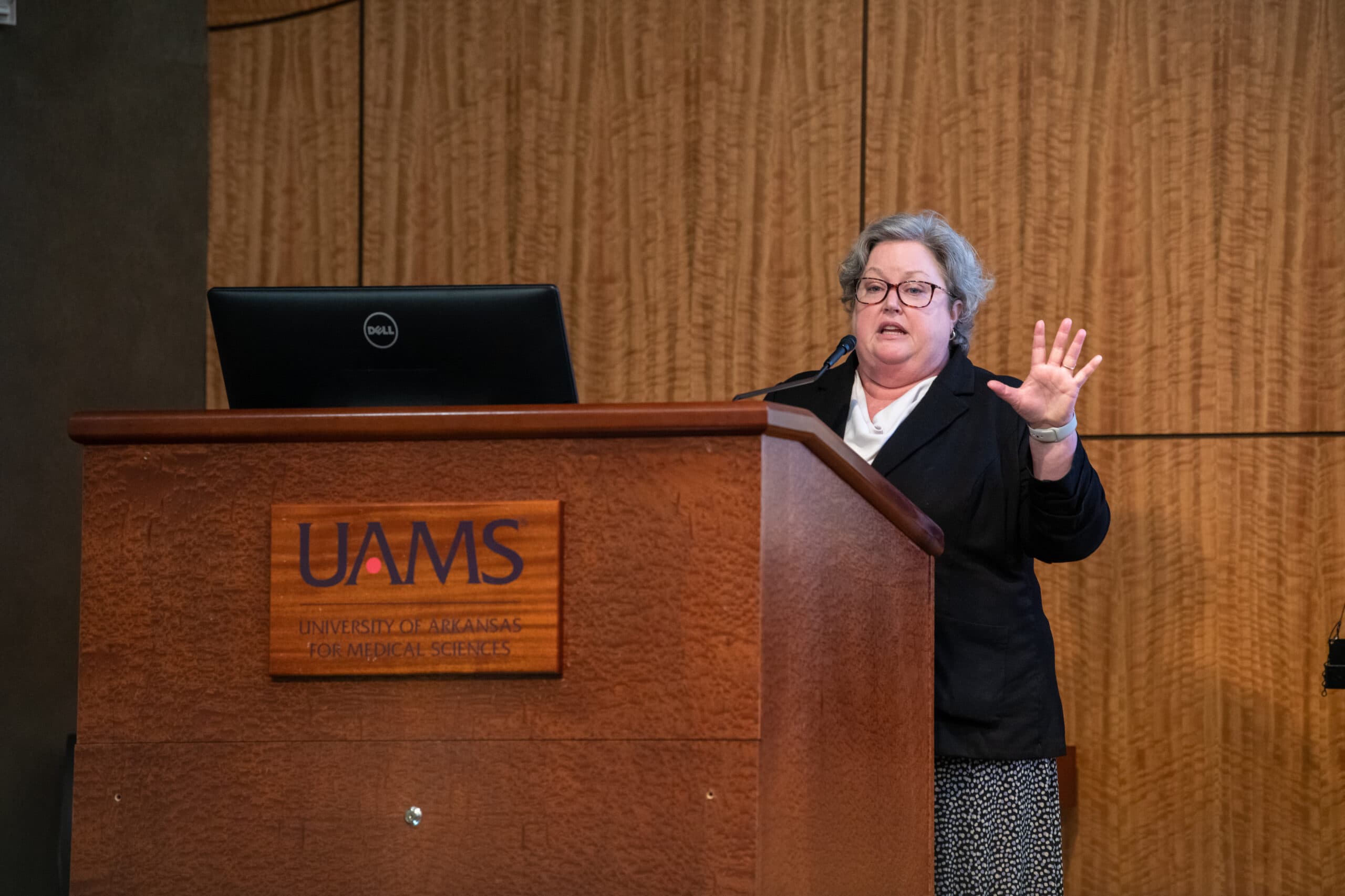View Larger Image

Karen E. Wickersham, Ph.D., RN, talks about cancer survivorship as part of the Dalme-Rickel Visiting Lectureship in Oncology/Community Health.
Image by Bryan Clifton
UAMS College of Nursing Hosts Lecture on Cancer Survivorship
| The University of Arkansas for Medical Sciences (UAMS) College of Nursing hosted Karen E. Wickersham, Ph.D., RN, of the University of South Carolina for a lecture about her research on cancer survivorship.
Wickersham, assistant professor at the Cancer Survivorship Research Center in the University of South Carolina College of Nursing, spoke to UAMS College of Nursing students and faculty members as part of the Dalme-Rickel Visiting Lectureship in Oncology/Community Health.
Much of Wickersham’s research focuses on tyrosine kinase inhibitors (TKIs), a targeted therapy that attacks certain types of cancer cells. Wickersham used her lecture to explore the meaning of cancer survivorship and the significance of targeted therapy.
Wickersham defined cancer survivorship as comprising anyone who has ever been diagnosed with cancer, no matter where they are in the course of their illness. “So whether they’re newly diagnosed or are patients with advanced cancer, they’re considered a survivor,” she said.
Wickersham said her research examines adherence to TKIs and management of the side effects from those drugs. The goal is to improve the quality of life for patients with advanced cancer who have experienced disparities in care based on their age or race.
“Cancer has been traditionally treated with surgery, chemotherapy and radiation therapy,” she said. “In the last 20 years, we’ve shifted to this use of targeted therapies.”

Patricia Cowan, Ph.D., RN, dean of the College of Nursing, and other attendees listen to the Dalme-Rickel lecture.Image by Bryan Clifton
Researchers initially thought targeted therapies would offer a solution that was less toxic than chemotherapy. But while these drugs have proved to be more convenient for patients, the side effects can be just as significant, Wickersham said.
“These toxicities that some patients experience can decrease their quality of life,” she said. “They can increase patient care costs, and they can lead to therapy interruption or discontinuation.”
In her graduate and postdoctoral studies, Wickersham focused on medication-taking by patients with lung cancer. She found that the decision to try targeted therapies was only a first step in a longer process. Patients weigh a variety of intervening factors — including disease progression, cost of therapy and side effects — and any one of those can cause them to discontinue treatment.
Wickersham’s early findings served as a model that she’s utilized and adapted over the past decade in her faculty research. She has conducted multiple studies on the effects of targeted therapies, particularly for older adults, and has developed an intervention plan to help patients manage their side effects.
Wickersham said she’s currently working on two projects that examine disparities in cancer care. One focuses on the development of a peer-to-peer training program for prostate cancer screenings among African American males in South Carolina; the other looks at disparities in the utilization of targeted therapies for lung, colorectal and breast cancers.
“Moving forward, continuing assessment of side effects and treatment of symptoms related to cancer is just one piece of the puzzle,” she said. “Symptom management is not just about assessment. It’s about monitoring and communication, and it’s about getting patients’ input on how we can help them best.”
The May 1 event was the first one held for the Dalme-Rickel Visiting Lectureship in Oncology/Community Health since the start of the COVID-19 pandemic. The lectureship is named after Frances Dalme, a community health nurse and longtime faculty member in the College of Nursing who died in 2020, and Linda Rickel, a UAMS graduate who is one of the first oncology nurse specialists in Arkansas.
“The College of Nursing was delighted to host Dr. Wickersham as our first Dalme-Rickel Visiting Lectureship speaker in more than three years,” said Patricia Cowan, Ph.D., RN, dean of the College of Nursing. “These lectures bring leading experts in oncology and community health to UAMS and enrich the educational experiences of the students, faculty and community.”